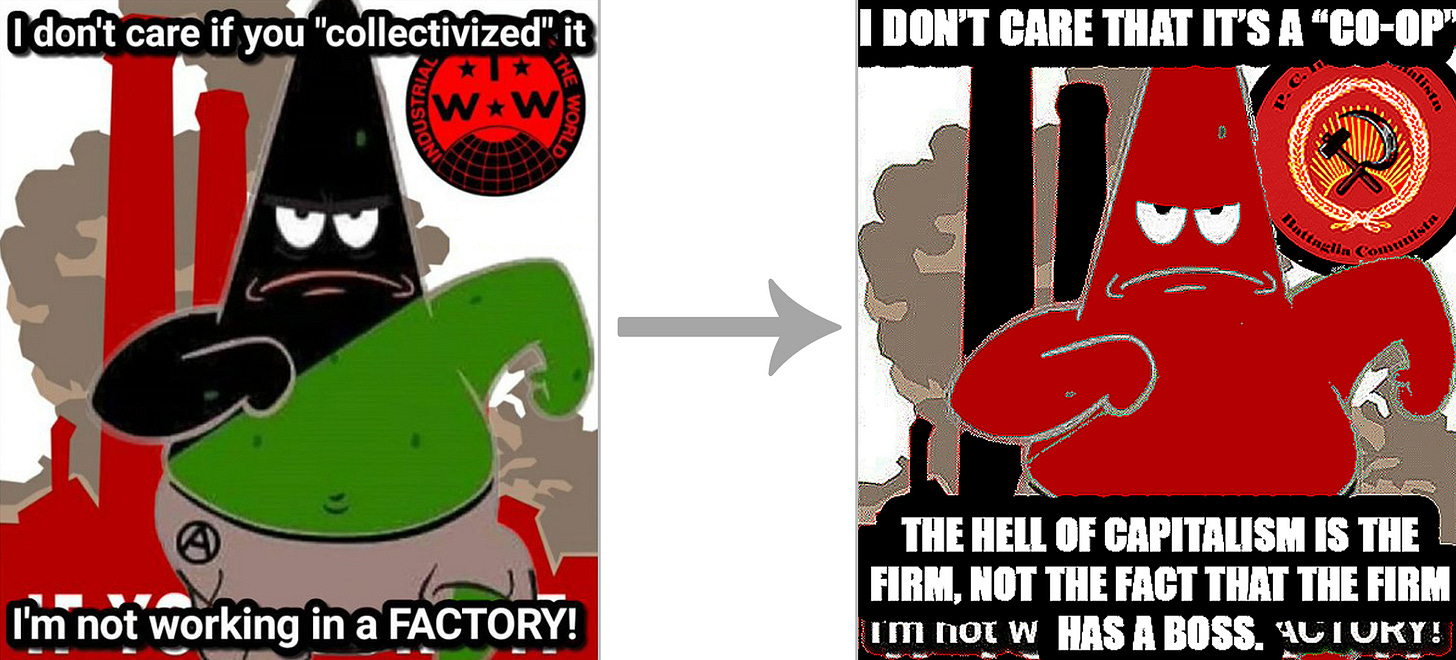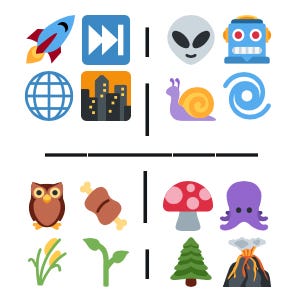“The world isn’t dying, its being killed”
In 2018, I self published Politigram & the Post-left. It told the story of a unique memetic subculture and followed their arc of radicalization in the wake of the 2016 election. Since that time, the communities outlined in my research have codified into three distinct but overlapping groups, broadly construed as Leftcom (Left-communism), the Ultra-left and U/acc (Unconditional Accelerationism). There is a big eco-anarchist hangover from the post-left era but most of the anti-tech rhetoric has been absorbed into a more mature and more comprehensive left-wing analysis. A strong emphasis is placed on the need to support indigenous struggles.
Among today’s young and online left, themes of communization and the abolition of work are ubiquitous. Hastily summarized, communization theory argues that “communism” is not a process. The revolution is not lead by a vanguard party or achieved through organized labor. They believe that the seed of the new society already exists within our current social order. The transition is instantaneous, leaderless and en mass. Given the shrinking runway within which we will lock in irreversible climate catastrophe, they just might be right.
Sometimes we can learn more about about these communities when we look for what is missing rather than what is shown to us. For example, few people are making memes about Eduard Bernstein or evolutionary socialism. It just doesn’t feel like there is enough time for a slow transition. Over the past few decades of neoliberalism, the left won the culture war and the right won economic policy. Maybe that’s why no one *literally no one, not a single solitary soul* seems to be making memes about Antonio Gramsci. Perhaps the idea of capturing cultural hegemony seems less useful when “wokeness” has become the PR tactic of most massive corporations. The good news is that no one under the age of 25 seems to be fooled by the need for more diversity among CEO’s.
“The boot is only bad if you’re under it”
The “Zoomer Right” is noticeably different from the free market evangelism and Tea Party politics of our previous decade. No one under the age of 25 is a “lolbertarian”. They make jokes about Ayn Rand and call Paul Ryan a cuck. Everyone believes in climate change. Young conservatives have aligned themselves with an older set of values that emphasize tradition and hierarchy. Most young right-wingers are economic protectionists and many are isolationist. Young people are wary of trade agreements and critical of America’s military presence overseas. Rallying cries like “support our troops” seem less effective when most people believe there is some variation of a deep state conspiracy in the government that now chooses to go to war.
As the Alt-right splintered, several new factions emerged from the rubble. Paleoconservatism is the current banner for young American nationalists. Ultimately, reactionary Catholicism has more historical traction with American populists than the European brand of identitarianism offered by the Alt-right. Accelerationism, or Civil War 2.0, is a darker side of the young right that pushes for an escalation of real world violence with vague notions of restarting society from the ashes.
In general, the interviews with right-wing accounts were mostly shorter in length than those with left-wingers. The detail oriented questions about logistics and political economy were more likely to answered as “basically the same as we have now”. On the whole, these participants seemed less interested in imagining a world much different from today but could easily imagine rationing today’s resources to secure their current positions. The past forty years of neoliberal austerity would seem to agree with them.
Tag Yourself
The next part of this series features twenty interviews with various political accounts. Most were conducted over Discord chat or Instagram DM. Participants were asked to describe, in detail, a positive vision of the future in 10-40 years time. The optimistic frame of this request was intended to run counter to the ubiquitous pessimism that so often characterizes these spaces. Some participants were able to answer these questions with relative ease while others struggled. Many defaulted back to describing the imminent dystopia they expect to unfold within their lifetime.
In reaching out to a wide variety of accounts, the overall response rate was about one-third. Of those who responded, about half chose to participate. Of those who participated, about two-thirds stuck around to complete the full interview. Needless to say, these communities are suspicious of outsiders. Many participants expressed concerns over how their communities have been inaccurately represented by journalists.
This small sample size covers a wide breadth of positions but it is not a proportionate representation. The memes and images used to illustrate these interviews are all found from similarly minded accounts, forums and servers. Their names are a pseudonymous approximation in the general style. Each account is described as one of the many possible outcomes from the “16 Futures” memes circulating at the time.
This series is a snapshot of young online radical politics from the summer of 2019 to January of 2020. The events of the next year will likely reshape these online communities.
Lastly, I think we can look to these spaces to diagnose the hopes and anxieties of the younger generation but not to extrapolate a political program. Teenagers will inherit the world’s problems but it is not their responsibility to solve it.








I really think you should perhaps also consider questioning them along different lines as well that are not explicitly political. That can sometimes be more revealing. Like for example, try probing them on interpersonal questions to better understand how today’s atrophied social sphere produced their political-brains. But try to be respectful and understanding about it, of course.
I believe much of “politigram” and all this “politicization without actual politics” is representative of a more general social recession rather than real, coherent ideology.
https://novum.substack.com/p/social-recession-by-the-numbers